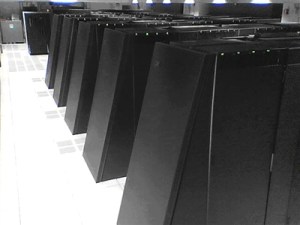 We see all types of people on Jeopardy!, and this February that will extend from “people” to “computers.” IBM is working on a device that it claims will be able to rival the two most successful champions of the game show, Ken Jennings and Brad Rutter.
We see all types of people on Jeopardy!, and this February that will extend from “people” to “computers.” IBM is working on a device that it claims will be able to rival the two most successful champions of the game show, Ken Jennings and Brad Rutter.
As you may remember, Jennings won the most consecutive games ever during the 2004 to 2005 season, and Rutler holds the title of most money taken home by a Jeopardy! contestant. But February 14 through 16, the two decorated winners will face a new type of challenge, one built specifically with them in mind.
Scientists at IBM have been developing a machine for two years that “can understand and answer complex questions with enough precision and speed to compete against some of the best Jeopardy! contestants out there.” The supercomputer has been codenamed Watson and has been programmed to not only recognize human language, but comprehend its meaning. It’s technically referred to as a “Question Answering” or QA system, and IBM assures us that Watson will have no outside help via Internet connection.
Jeopardy! questions often involve more than just a straightforward question. There are riddles and word play, things difficult for your ordinary computer to decipher. But Watson will be able to “distinguish between relevant and irrelevant content, and ultimately, demonstrate confidence to deliver precise final answers.” And it will also answer with the speed necessary to win the game. The machine has been training for the big day. Over the fall, Watson took on over 50 former Jeopardy! winners as practice, and passed the same exam all participants of the game show are required to take.
In a press release, IBM revealed that there is more to Watson than winning a game show. The purpose of the supercomputer is to take human-computer communication to the next level by imitating the human mind as closely and accurately as possible.
The winner of the upcoming tournament will receive $1 million; second place $300,000 and third $200,000. The human contestants will donate half of their earnings if they win, and Watson will donate all of it. May the best man or machine win.
Editors' Recommendations
- IBM president confirms that the chip shortage will last ‘a few years’ more
- Can a supercomputer save us from the coronavirus? We spoke to the man who knows

